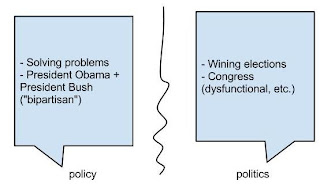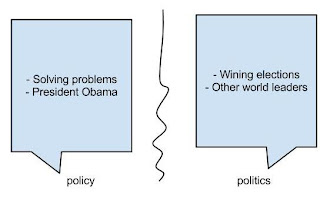In Science and Technology Studies (STS), the sociologist
Thomas Gieryn has a concept that he calls
boundary work. Boundary work is the work of defining what constitutes science, of deciding on the boundary between science and pseudo-science (or non-science), or that between science and politics, or between science and religion, among others. This work is done
not in laboratories but in public debates, and often not by scientists, but by others: "journalists, bureaucrats and lawyers" (not to mention philosophers!). In other words, boundary work is about the consumption and circulation of science. Gieryn's is explicitly a constructivist stance. He takes for granted that the boundary between science and non-science is made rather than found; is pragmatic rather than conceptual; and takes a good deal of work to police and maintain--a stance that is the foundation of STS.
In this blog-post, I am interested in a similar kind of boundary work w.r.t. "politics" that happens in American public culture (which builds on the pre-existing boundary work w.r.t. science). The boundary work in public life then consists of establishing that something--a course of action, a guiding principle--is "policy" and not just "politics." "Policy," here, is seen as the opposite of politics: a rational technocratic exercise where a group of skilled people sit down and solve problems. Policy-making obviously gains its legitimacy from its similarity to doing science and from science's cultural authority, in particular, its image as rational, skeptical, and as being about facts rather than values. Since it is governments that do policy, and governments are almost always seen as political, how might one separate policy from politics--and that too, using the cultural authority of science? I would say that it is done by seeing policy-making as "solving problems" rather than, say, resolving conflicts between opposing interest-groups.

An almost perfect illustration of this is
Timothy Geithner's "exit" interview with the New Republic's Liaquat Ahamed. Like everyone else, I was excited to read it. What would Geithner say about the financial crisis which he inherited from Hank Paulson (although he was already a player in it as the head of the New York Fed), and which he--at least in some sense--brought to a close? That he chose not to talk about the juicy times of his tenure will surprise no one [1]. What was interesting about the interview though was the way he used the occasion to perform boundary work.: his own work, he insisted, was about policy-making, not "politics"; his job was to "fix the problem" at hand (the financial crisis, that is). He was lucky, he claims, that President Obama is also a policy-maker President, who sees his advisers as offering policy advice that is not based on political expediency.
In the next few paragraphs, I'm going to do a
Wittgenstenian analysis of how Geithner
uses the terms "policy" and "politics" respectively to show the kind of boundary work that is being done. In response to a question from Ahamed on whether he "saved the economy, [and] lost the public," Geithner says:
I think that’s a great question. I think it’s hard for any of us to know. My own view was that it was going to be very hard, if not impossible to design a financial rescue that was going to be effective in protecting all the innocent victims hit by the crisis and still satisfy the completely understandable public desire for justice and accountability. Those things were in direct and tragic tension, never resolvable at that time. I always felt that the only preoccupation for people in policy at the time should be to fix the problem as quickly as we could, as effectively as we could, and only after that would other things be possible, including how to figure out not just how to clean up the mess, but reform the financial system. [my emphasis.]
Public desire for justice and accountability is "understandable," says Geithner, but "the only preoccupation for people in policy at the time should be to fix the problem as quickly as we could." Immediately, a distinction is made between "people in policy" whose task is seen as "fix[ing] problem[s]," and the "public" that wants "accountability."
In answering the next question, which was about his working relationship with President Obama, Geithner makes his point even more explicitly. The President, he says approvingly, is interested in policy, not politics.
I always had the sense that he was going to put policy ahead of politics. And he always made it clear to people working for him that our job was to inform him of what the relative merits were of the policy choices, not to try to do the politics for him, or to limit our prescriptions by what was politically expedient. I think the country was very lucky because as you know, there have been lots of other examples in other countries, and certainly in our history, where the leaders of the country were much more reluctant to put politics aside and take the sting of a more decisive resolution. I’ve talked about this before, but I think that what really distinguishes countries in crisis are those that are lucky enough to have political leaders who are willing to take the brutal political cost of doing what’s necessary and those countries that waited and let the populist fires burn, or decided they were going to try to teach people a lesson and put populism ahead of other things. Those countries had far worse experiences in crisis than we had. [my emphasis].
Politics here is identified with the messy, grubby business of getting votes. And political costs are just that: electoral defeats. Good "policy" can lead to electoral defeats, and President Obama, Geithner says, did not put politics first (meaning electoral victory), unlike a lot of other world leaders. Or, to put it in a rather crude pictorial version:
The interview moves on to other things. When asked what the most frustrating part of being the Treasury Secretary presiding over the financial crisis, Geithner says:
The most frustrating part of this work, but in some ways it’s the most consequential, is how effective you can be in relaxing the political constraints that exist on policy. You can see that most compellingly now in the fiscal debate. Paulson before us and the President were very successful during the crisis in getting a very substantial amount of essential authority essential to resolving the crisis. But it has been very hard since then to get out of the American political system more room for maneuver both on near-term support for the economy, as well as reforms that would lock in a sustainable fiscal path. That is the most frustrating thing, to get the political system to embrace better policies for the country. [my emphasis].
On close analysis, we see that the politics/policy distinction is now no longer about winning elections versus crafting solutions. The "fiscal debate" is about whether the Federal Government needs to boost spending in order to counteract the effects of the recession and boost employment. But funding appropriations are done through Congress which has no stomach for more spending (preferring instead to concentrate on deficits). Politics and policy now become separated by the different arms of government. Congress, playing "politics,"--that is, concerned with re-election--denies the President the policy levers (fiscal stimulus, monetary expansion) that he can use to combat the recession.

This is only bolstered when Geithner includes President Bush's team as part of an all-inclusive "we" who dealt with the crisis as policy-makers should. As opposed to Congress, that is, which is clearly not part of the "we." This also helps Geithner use the word "bipartisan"--which carries great currency in American political debate today.
I really believe that given the choices we had at the time, with the authority we had and the options available to us, that we did a very effective job. And by “we,” I mean in many ways this was a bipartisan response across two administrations that will look good against the comparison of what we know about other crises of this magnitude.
Then things get interesting. Ahamed asks Geithner what his views on austerity are; was he, Geithner, responsible for the shift in the President's focus from fiscal stimulus to debt reduction?
TG: It was definitely my view, and it still is, that our ability to get more growth-promoting policies out of the Congress is contingent on our ability to put in place long-term fiscal reforms that restore sustainability. That’s true for lots of different reasons. It’s true not just because, without action, the natural dynamics of demography and healthcare costs would crowd out a whole range of investments over time. But it’s also true the average person, facing deficits this large, is just uneasy supporting substantial additional growth-relevant fiscal policy without that framework. So that’s the main reason why I was a supporter of trying to make a more credible commitment to some gradually phased-in, sensibly designed restraints over time. I think without that, there was no way we were going to be able to make the case for a big long-term infrastructure program. [my emphasis.]
And then, suddenly, everything gets unscrambled here (on close reading, that is). The President's policy-making--his ability to bring the economy back from high unemployment and low growth--is seen as constrained, not just because Congress is a grubby, political machine, intent on re-election, but because Congress needs to be convinced of "our ability to put in place long-term fiscal reforms that restore sustainability." And then, that staple of politics proper is brought in: "the average person." "It’s also true," says Geithner, that "the average person, facing deficits this large, is just uneasy supporting substantial additional growth-relevant fiscal policy without that framework." Who is this average person? Does he stand for a member of the Congress? Or does he stand for the public that each Congressman acts as a spokesman for?
It's unclear, which, I think, is the point. And note that the word "politics" doesn't appear at all in this quote, precisely (I think) because Geithner is talking about politics. Not politics as grubby vote-getting, but rather, politics, as a mechanism of reconciling different sets of values and priorities. And while that idea is present in his remarks ("without that ... no way we were ... able to make the case for"), he does not call it politics. With his references to the "average person," Geithner brings in the imagined public in whose name the US Government acts. And he suggests that policies of fiscal expansion need their stamp of approval from this public, and setting out a plan for the deficit is one way of securing this. The refusal to use the word "politics" to describe this, and the use of the imagined public of "average person(s)" to legitimate his own policy, suggests, again, that this is an instance of boundary work.
Why is this at all important? As I suggested before, in public life, it is often easier to argue over facts, rather than values. The use of numbers--risk analysis, what have you--in public life, as Theodore Porter suggests, accomplishes precisely this purpose. The US Army engineers used the language of cost-benefit analysis (of public projects) to make their decisions seem more rational, and less political. And while it has its advantages, and permits a certain kind of discussion, the use of mathematical cost-benefit analysis doesn't make a political decision less political; it simply puts the values into the background.
Sometimes--many times--it's useful to put values in the background and talk about facts and methods. At others--and the financial crisis, it seems to me, is a key candidate for this--it's probably better to bring the values into the foreground, with the facts and the methods. And that's why Tim Geithner's boundary work is important.
------
[1] The interview itself was guarded. Geithner didn't say much about the conflicts within the Administration over the appropriate response to the Great Recession (fiscal stimulus vs. austerity? bank nationalization vs. capitalization? and so on). He seemed to indicate that the route the Administration had taken--TARP, recapitalization, Fed lending, stress tests--had worked pretty well, under the circumstances. And he ended on this chilling (but quite appropriate, I should think, for a regulator) about the inevitability of financial crises:
I think there’s something about human beings, and something about financial systems, where people tend to give less weight to the risk of an extreme event. So after a long period of relative stability, like we had in the U.S. and the world economy in the decade before this, that leads people to take on more risk than they should, borrow more than they should, and that’s what creates the vulnerability to crisis.
The things we did in this crisis, and certainly the things we did in financial reform, will significantly reduce the probability and the intensity of crises for a long period of time. Because there’s much more capital in the financial system. We did a pretty brutal restructuring of our financial system as a part of the crisis response. I know that markets over time will find their way around those things, and memories will fade. But if we’re lucky that will take a long time.
And Geithner appears surprised at the finance community's rather fierce response to the teeny-weeny bit of class war rhetoric that President Obama used in his public addresses.
I’m biased but I felt that in the basic strategy that the President embraced and that we put into effect, we did something that was incredibly effective for the broad interest of the economy and the financial system. I feel the President’s rhetoric over that period of time was very moderate relative to the populist rage sweeping across the country. And I never quite understood why the financial community took such offense at what was such moderate rhetoric relative to what we have seen in other periods in history.






